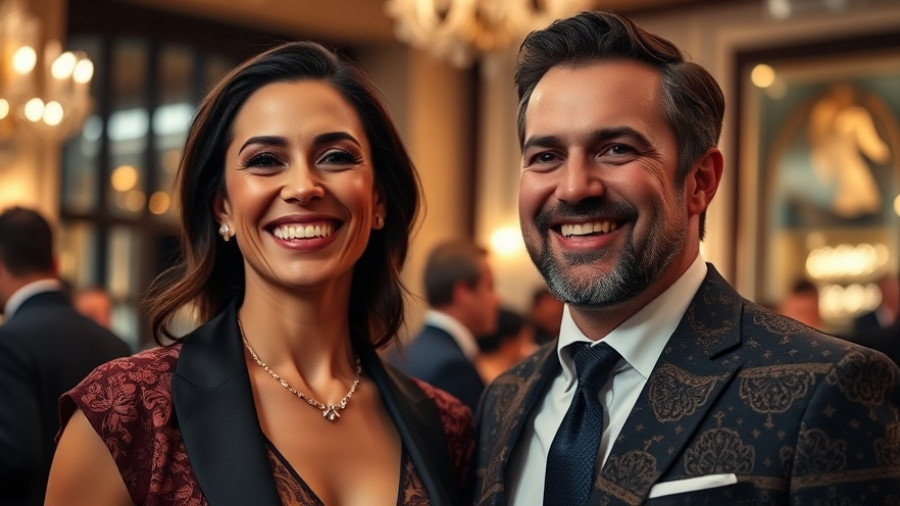
A Love That Transcends Time: Alan Hamel's AI Tribute to Suzanne Somers
In a groundbreaking blend of technology and emotional legacy, Alan Hamel has taken a bold step by introducing an AI clone of his late wife, Suzanne Somers, who passed away in 2023. Celebrated for her impressive career and her lasting impact on fans worldwide, Somers’ memory will now be perpetuated through this digitally reincarnated version of herself, dubbed the "Suzanne AI Twin." This initiative emerged not just out of grief, but from a shared vision that the couple had nurtured over decades.
AI: A Retrospective on the Technology Revolution
The notion of using AI to recreate a deceased loved one has lingered in the realm of speculation and science fiction. However, with constant advancements in artificial intelligence, the technology is rapidly evolving into applications that allow such dreams to become reality. The idea first emerged in conversations between Hamel and futurist Ray Kurzweil in the 1980s. Back then, few could have imagined the extent to which AI technology would manifest—turning out to be far more than mere predictions.
Crafting the Clone: How Was It Done?
One of the most fascinating aspects of the Suzanne AI Twin is the extensive training that has gone into creating a credible likeness of her persona. The AI was based on hundreds of interviews, all 27 of Somers' books, and a range of personal interactions that Hamel shared with her over years. The technology aims to not only emulate her voice but also reflect her opinions on numerous subjects, especially health, which was a cornerstone of Somers’ career.
Balancing Nostalgia with Ethical Concerns
Despite the technological marvel, Alan Hamel's endeavor raises significant ethical questions. Can the resurgence of someone's likeness through AI be viewed as a tribute or as a commercial exploitation of their legacy? Some may argue that the project's core intention—to provide comfort and connection for grief-stricken fans—is commendable. Yet, critics may voice concerns about authenticity and potential misrepresentation, particularly when the AI is programmed to dispense health advice, as Hamel has claimed.
The Perspectives of the Next Generation
Hamel has acknowledged the mixed feelings surrounding AI technology, even within families. It appears that the younger generation in his family is more accepting of the project, viewing it as a progressive tool for maintaining a connection with their loved ones. They advocate for a future where digital replicas become just another way to bond with those who have passed, signifying an acceptance of this brave new world where technology complements human experience.
A Glimpse into the Future: AI and Celebrity Culture
The Suzanne AI Twin is not an isolated incident but part of a broader trajectory wherein celebrities explore digital immortality. Hamel’s ambition parallels the trend of private companies offering “digital twin” experiences, creating spaces where fans can virtually interact with their idols, long after they have left the physical world. This raises the question: How will the relationship between public figures, their legacies, and their fans transform in the age of AI?
Reaching Out: Embracing AI Conversations
Fans of Suzanne Somers will soon have the opportunity to converse directly with her AI counterpart on SuzanneSomers.com. This 24/7 accessibility represents an innovative approach to customer engagement while perpetuating Somers' legacy. But as this initiative develops, it will be crucial to ensure that interactions remain authentic and informative—an idea Hamel seems passionate about, striving not to let misinformation dilute the trust built over the years through Somers’ reputable health advice.
Closing Thoughts: How Should We View AI Replicas?
The emergence of AI clones brings forward numerous reflections on our relationships, mortality, and technology’s evolving role in our lives. As entrepreneurs and small business owners, it’s essential to assess the implications of such advancements for our ventures and branding strategies. While the bonding experience offered through AI clones might resonate with emotional needs, are small business operators prepared to engage with technologies that blur the lines between reality and digital simulations?
As we stand on the brink of this uncharted territory, the question lingers: What will the ramifications be for future generations, and how can we leverage these innovations responsibly? Explore these avenues further and consider the role technology could play in not just businesses but the legacy we leave behind.
For those interested in further discourse or implementation strategies concerning AI in your business workflows, staying abreast of advancements is crucial. Embrace the conversation on AI ethics, creative applications, and what they mean for our collective futures.
 Add Row
Add Row  Add
Add 




Write A Comment